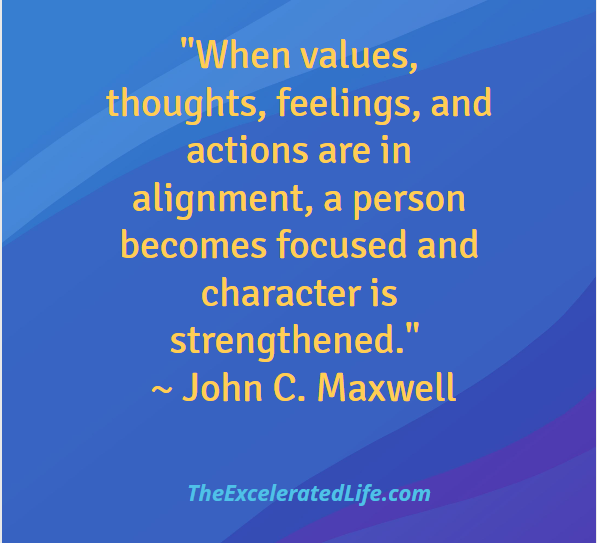You and I run the risk of wasting days, weeks, even years, by focusing on unimportant things and by not bringing our time, energy, and attention into alignment with our BIG goals. We must take specific, intentional action to focus on and align our efforts with our desired outcomes. By aligning your actions with your true desires and practicing with intention and presence, you can make significant progress toward achieving your goals and mastering new skills.
A Change of Focus
Sandy dreamed of becoming a published author. She’d had this dream for years. She spent countless hours daydreaming about her debut novel, envisioning herself signing copies in a local bookstore, and even fantasizing about holding her published work in her hands.
However, Sandy’s actions didn’t align with her dreams. She had a demanding job and a busy family life. Anytime she had a free moment, she’d often procrastinate by watching TV or scrolling through social media. Her manuscript gathered digital dust on her computer.
Then, she hit a milestone birthday. That day, something clicked within Sandy. She realized that if she truly wanted to achieve her dream of becoming an author, she must align her daily actions with her long-term goal. So, she made a commitment to write for just 15 minutes every day, no matter how busy her schedule was.
Over time, those daily 15-minute writing sessions added up. Sandy started to see real progress in her manuscript. She had sharpened her focus and was aligning her actions with her desires. And it made all the difference. Eventually, she finished her novel, secured a publishing deal, and held her book in her hands, just as she had always dreamed.
Sandy’s story shows us that when you and I take small, consistent actions that align with our desires, we can turn our dreams into reality. But to do that, we need to sharpen our focus and align our actions and our BIG goals.

The Importance of Alignment
“When you are genuinely being your true self, you need no words of explanation. You just are.” ~ Laurie E. Smith
Be true to yourself. Being in alignment with your true self means living in harmony with your beliefs and your aspirations. It means your intentions and actions are in harmony, that you do what you say you will do.
Why is alignment important? When you are in alignment with your inner (true) self:
- You experience more joy and creativity.
- There is less inner turmoil and stress.
- You experience higher levels of self-control and discipline.
- You enjoy improved well-being, happiness, and fulfillment.
The Importance of Focus
Focus is your ability to concentrate attention and mental effort on a specific task, goal, or activity without being distracted or deviating from the intended objective. It involves directing your mental energy, attention, and resources toward a particular subject or activity, thereby excluding unrelated or irrelevant factors.
Focus and goal setting go hand-in-hand. To be focused, you need clear goals and to achieve your goals, you need focused effort.
Why is focus important? When you are focused:
- You get more done.
- You produce higher-quality results.
- You experience less stress.
The Importance of Focus and Alignment
Focus and alignment are complementary elements that work hand in hand to contribute to successful living. When you focus on your BIG goals and the things you want to accomplish with your life, then align your energy and effort to move you in the desired direction, you are more likely and able to live a life of flourishing, well-being, meaning, purpose, and Service.
Focus gives you the ability to direct your attention, energy, and efforts toward specific goals, tasks, or objectives. It involves concentration, clarity, and dedication to a particular purpose. When you focus, you minimize distractions and concentrate on what matters most at a given moment. It’s like wielding a magnifying glass to concentrate sunlight, generating intense heat and eventually causing something to ignite. In a similar way, focusing your efforts intensifies your progress toward your goals.
Alignment refers to coherence, consistency, and harmony between various aspects of your life, such as your values, goals, actions, and beliefs. When your actions and intentions are aligned, they support each other and create a synergy that propels you forward. It’s like the gears in a well-tuned machine, each one turning smoothly and synchronously, generating efficiency and progress.
When you combine focus and alignment, you gain a number of advantages.
Focus provides clarity by directing your attention to specific goals or tasks. Alignment ensures that these goals resonate with your values and aspirations, providing a clear sense of direction.
Focus ensures that you concentrate your efforts on the essential tasks, avoiding distractions. Alignment ensures that these efforts are in harmony with your overall purpose, making your actions more effective.
Alignment ensures that your actions are consistent with your values and long-term goals. Focus helps maintain this consistency by continuously directing your attention, thus building momentum toward your objectives.
Focus enables you to make more informed decisions by prioritizing what’s important. Alignment ensures that these decisions align with your overall life trajectory and aspirations.
When your focus is aligned with your values and purpose, it can provide a deep sense of motivation and resilience, allowing you to overcome obstacles and challenges.
Focus without alignment can lead to achieving goals that aren’t meaningful or fulfilling for you. Conversely, alignment without focus may result in having a clear sense of purpose but without the concentrated efforts needed for progress. Together, they create a powerful synergy that drives progress while ensuring that the direction of this progress is in tune with your values and aspirations.

Focus On Things You Can Control, Ignore The Rest
In life, there are some things that we can control, others (some would say “many others”) that are beyond our direct control. In the Stoic philosophy, this is called the “dichotomy of control”. To be at our best, we must focus our energy and other resources to influence and impact what we can control, and let go, as much as possible, of what we cannot control. [Pigliucci]
Another way to look at it is through what psychologists call an “internal locus of control” versus an “external locus of control”. These relate to how you and I perceive and respond to events in our lives.
With an internal locus of control, we believe that we have control over the outcomes in our lives based on our actions, decisions, and efforts. People with an internal locus of control tend to take responsibility for their successes and failures, viewing themselves as the primary agents in shaping their destinies. They often exhibit greater self-motivation, resilience, and a proactive approach towards problem-solving.
Conversely, an external locus of control implies the belief that external forces, luck, fate, or other people primarily dictate events and outcomes in life. Individuals with an external locus of control often attribute their successes or failures to factors beyond their control, such as luck, chance, fate, or powerful others. Consequently, they might feel less empowered, exhibit lower self-confidence, and might be less inclined to take initiatives or risks.
An internal locus of control is more conducive to the idea of understanding what you can’t control, knowing what is within your control, and focusing on the latter.
Do, Observe, Correct
“If you are not in control of your thoughts, then you are not in control of yourself. Without self-control, you have not real power, regardless of whatever else you accomplish. If you are not aware of the thoughts that you think in each moment, then you are the rider with no reins, with no power over where you are going. You cannot control what you are not aware of. Awareness must come first.” ~ Thomas M. Sterner
In The Practicing Mind, Thomas M. Sterner emphasizes the importance of focus and aligning your actions with your true desires as a key component of achieving mastery and personal growth. One of the practices he describes is called “Do, Observe, Correct” (DOC). When you follow the practice of DOC, you act, you observe the results of your action, then you make corrections as needed to move closer to your objective. It’s like throwing a dart and attempting to hit a target at the other end of a football field. Sterner offers these suggestions to help you incorporate this as your own practice. [Sterner]
Focus on the process of practicing a skill rather than fixating on the end result. True mastery comes from engaging fully in the present moment and enjoying the journey of improvement.
Pay attention. Practice mindfulness and be present in the moment. By paying full attention to what you’re doing, that is, focusing, you can better align your actions with your true desires and values.
Minimize distractions and external “noise” that divert your focus from the task at hand. This helps create a more mindful and effective practice environment.
Clarifying your true desires. To align your actions with your true desires, you need to have a clear understanding of what those desires are. Take time to reflect on your values, passions, and long-term goals.
Know what your capabilities are and set realistic expectations. Aligning your actions with your true desires involves setting achievable goals and recognizing that progress may be slow and incremental. Again, focus on the process and let the results take care of themselves.
Develop a growth mindset where you view challenges and setbacks as opportunities for learning and growth rather than as failures. This mindset encourages you to persevere and stay aligned with your true desires.
Let go of impatience and the desire for quick results. Aligning your actions with your true desires requires patience and a willingness to enjoy the journey.
Finally, regular practice and consistent effort are essential for aligning your actions with your true desires. Sterner encourages us to maintain a disciplined practice routine.
Focus and Alignment for Successful Living
Remember Sandy in the opening story? She wasted years by focusing on too many unimportant things and by not bringing her time and energy and attention into alignment with her BIG goal. You and I run that same risk unless we take specific intentional action to focus on and align our efforts with our desired outcomes.
And yet we don’t focus on the outcome. In the words of Sterner, we want to “use the final goal as a rudder to steer your practice sessions, but not as an indicator of how you are doing.” [Sterner] When you focus exclusively on the final product, you are misusing the goal. Focusing on the process is correctly using your goal as a rudder. As is developing a growth mindset, learning from your mistakes, and using so-called obstacles to grow stronger.
By aligning your actions with your true desires and practicing with intention and presence, you can make significant progress toward achieving your goals and mastering new skills. And that is embracing your Excelerated Life™!
What is one thing you can start doing to bring more focus and alignment into your efforts?
How could you begin today?
Share your thoughts by leaving a comment below.
Excelerated Focus™ — aligning your actions with your true desires — is one practice for creating your Excelerated Life™, a life of flourishing and well-being, and a life of meaning, purpose, and service.
Read more about the Excelerated Life™.
Resources:
Pigliucci, Massimo and Gregory Lopez. A Handbook For New Stoics: How To Thrive In A World Out Of Your Control. New York: The Experiment, LLC, 2019.
Sterner, Thomas M. The Practicing Mind: Developing Focus and Discipline in Your Life. Novato, CA: New World Library, 2005, 2012.
[*] This blog post includes research information and suggestions provided by ChatGPT, an AI language model developed by OpenAI. The content was generated with AI assistance and is intended to provide information and guidance. Please note that the suggestions are not official statements from OpenAI. To learn more about ChatGPT and its capabilities, you can visit the OpenAI website. https://openai.com/


